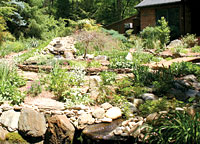Anyone who pays much attention to cultivated plants knows that there are gardeners, and then there are gardeners. People in the former category (my crowd) tend some plants and keep their yards whacked into some semblance of order. But those other folks—the true master gardeners—go way further, creating horticultural tapestries of interleaved and interwoven grace. The nationwide Master Gardener Volunteer Program has formalized the term; working with their local Cooperative Extension Service office, volunteers complete a training course and then share their knowledge with the community via a hot line and other outreach efforts.

The Buncombe County Master Gardeners have also established a college-scholarship program for students in the region. So far, the group has provided scholarships to two Warren Wilson College environmental-studies students. To help fund that program, these volunteers are hosting a tour showcasing seven of their own gardens on Saturday, June 30. Among those featured will be the garden and orchards of John and Barbara Schnautz.
John joined the Master Gardener program in 1992, two years after he and Barbara retired to Erwin Hills, just northwest of Asheville. When they arrived, a little less than half of their 3.5 acre home site was densely wooded; the rest was a clearing. The woods around the house have been transformed into a mostly shaded garden, with ponds connected by artful stone waterfalls and serpentine paths that wind between stands of herbaceous perennials, shrubs and ground cover. The clearing has given way to a fruit-and-berry orchard surrounding a large vegetable garden.
Although they tend dozens of apple and pear trees, blueberries, raspberries and grapevines that normally produce abundant fruit, the couple manages to use most of what they grow, notes John. “Every year there is some fruit in surplus,” he reports. “When it’s apples we make applesauce, dried apples, cider and apple wine. Last year we had 24-1/2 bushels of sour cherries; we froze them and dried them and made cherry wine. Other years we make grape wine. We always manage to eat it all or give it away.”
Shortly after moving in, the couple built a 13-by-31-foot greenhouse adjoining their home, complete with a hot tub from which they can keep a steamy eye on the seedlings arrayed on lighted shelves nearby. The garden, orchard and greenhouse will all be open during the tour.
Concerning this year’s Easter freeze, John says: “We usually pick about 400 quarts of blueberries, but I don’t see any this year. And I don’t see any apples. I don’t expect to have any cherries, either.” Since Xpress visited the site in late May, a hailstorm swept through, shredding the Schnautzes’ water lilies.
“That’s too bad, but it’s part of gardening,” Extension Agent Linda Blue says philosophically. “In the same way that the freeze will figure in the educational component of the tour, the effect of hail has become one of the lessons.
“We wanted our tour to be more than just a look at pretty gardens,” she explains. “We wanted to make it a learning experience. At every garden there will be educational materials and planned activities so gardeners can learn firsthand from other gardeners.”
The variety of designs included in the tour should appeal to all types of gardeners. Hillside gardening, traditional cottage gardens, low-maintenance borders, native plantings, vegetable gardens and more will be featured in what the master gardeners aim to make an annual event. As a sweetener, attendees will receive a tote bag stocked with discount coupons from garden suppliers around the county.
“Tourgoers will have the opportunity see successful local gardens and to learn directly from gardeners what worked and what failed,” observes tour chairman Ernie Henshaw. “This is a great chance for folks that are interested in improving their own landscape to see firsthand what can be possible in the our area.”
The garden tour happens Saturday, June 30, from 10 a.m. to 4 p.m. Tickets ($15) are selling briskly, and only 500 will be sold. They’re available at the Buncombe County Cooperative Extension office, 94 Coxe Ave., in downtown Asheville (cash or check only). For more information, call 255-5522.



Before you comment
The comments section is here to provide a platform for civil dialogue on the issues we face together as a local community. Xpress is committed to offering this platform for all voices, but when the tone of the discussion gets nasty or strays off topic, we believe many people choose not to participate. Xpress editors are determined to moderate comments to ensure a constructive interchange is maintained. All comments judged not to be in keeping with the spirit of civil discourse will be removed and repeat violators will be banned. See here for our terms of service. Thank you for being part of this effort to promote respectful discussion.